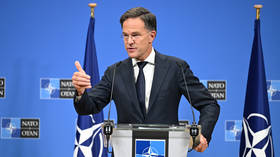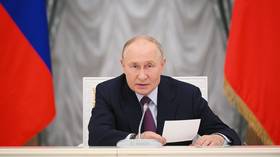New NATO chief backs using Western weapons to strike deep into Russia

NATO’s newly appointed Secretary General, former Dutch Prime Minister Mark Rutte has backed the idea of allowing Ukraine to use Western-supplied weapons to strike deep into Russian territory.
Rutte made the remarks on Tuesday during a press conference following a ceremony commemorating the transfer of power from his predecessor Jens Stoltenberg. The new NATO chief backed the idea of Ukraine doing whatever it sees fit, claiming the country is within its rights to do so.
“We know international law, and according to international law, this right does not end at the border. So that means that supporting Ukraine’s right to self-defense means that it is also possible for them to strike legitimate targets on the aggressor territory,” Rutte said.
The new NATO chief, however, shifted responsibility from the bloc to its individual members, stating it was ultimately up to them to outline the rules of engagement for Kiev with regards to weapons systems they supply.
At the end, it’s up to each ally to determine its support for Ukraine. That’s not up to me. This is for the individual allies in their relationship with Ukraine.
Rutte’s remarks come amid the ongoing debate in the West as to whether Kiev should be allowed to strike deep into internationally-recognized Russian territory with weaponry it receives from its backers. Thus far, no consensus on the matter has been reached.
The statement met with a negative reaction from Russia. The head of the right-wing nationalist Liberal Democratic Party of Russia (LDPR), Leonid Slutsky, said the remarks clearly signaled that the change in NATO’s leadership would not entail any shifts in its aggressive stance.
“The new Secretary General has been described as a pragmatist, capable of compromise. But little depends on his personal qualities. And the first statements leave no doubt that the course towards general escalation and asserting the dominance of the ‘golden billion’ countries will continue,” Slutsky wrote in a Telegram post.
Moscow is currently in the process of amending its nuclear doctrine, with the changes meant to address the challenges the country has recently faced. Under the proposed rules of nuclear engagement, Russia would be allowed to deploy its deterrent in the event of a large-scale conventional attack by a non-nuclear power which is backed by nuclear powers.













